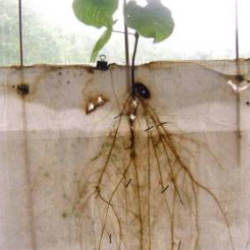Source Institutions
Source Institutions
Add to list Go to activity

In this indepth hands-on activity, learners build a structure that allows them to observe the growth of roots and the correlation between root growth and stem extension. Because no dirt is used in this arrangement, a guiding question can be posed: What does the plant need to grow? The PDF includes activity rationale, procedure, background and follow-up discussion suggestions. [Activity is publicly available through a web crawler capture on Archive.org.]
- 1 to 7 days
- 1 to 4 weeks
- $10 - $20 per group of students
- Ages 8 - 14
- Activity, Experiment/Lab Activity, Lesson/Lesson Plan
- English
Quick Guide
Materials List (per group of students)
- 1 wallpaper tray (per group)
- 1 seed (per group)
- 1 dowel 1-1/8 inch in diameter, 3 feet long (per group)
- 8 medium binder clips (per group)
- 1 roll of plastic wrap
- 1 grow lamp if natural light is unavailable
- white paper towels
- 4-5 boxes of T-pins
- masking tape (1/2 inch wide)
- digital camera(s)
- 1 piece of plastic cardboard 10 inches x 20 inches (per group)
Subjects
-
Life Sciences
- Cells
-
Diversity of Life
- Plants
-
Ecology
- Energy Flow and Chemical Cycles
-
Physical Sciences
-
Chemistry
- Chemistry of Life
-
Chemistry
-
Mathematics
-
Data Analysis and Probability
- Data Analysis
- Data Collection
- Data Representation
- Measurement
-
Data Analysis and Probability
-
The Nature of Science
-
The Scientific Process
- Asking Questions
- Conducting Investigations
- Gathering Data
- Formulating Explanations
-
The Scientific Process
Informal Categories
- Gardening
- Nature and Environment
Audience
To use this activity, learners need to:
- see
- touch
Learning styles supported:
- Involves teamwork and communication skills
- Involves hands-on or lab activities
Other
Access Rights:
- Free access
By:
Rights:
- All rights reserved, Education Development Center, Inc., 2010
Funding Source:
- National Science Foundation, DRL‐0714703
